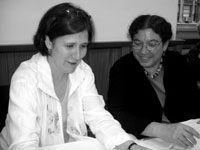
Teachers College,
Education Update & Phi
Delta Kappa Host Drs. Klass and Costello to a Full House
by Joan Baum, Ph.D.
Bringing lively informality
to a no-nonsense discussion about the plight of “quirky kids” at
a recent talk and book signing at Teachers College, sponsored
by the TC Alumni Council, the TC chapter of Phi Delta Kappa
and Education Update,
Drs. Perri Klass and Eileen Costello, distinguished Boston
primary care pediatricians, held a full-house in thrall as
they moved through a review of the challenges facing parents,
doctors, teachers—and the kids themselves—about
what it means to be “quirky.” The
word takes its definition from the subtitle of their book, Quirky
Kids: Understanding and Helping Your Child Who
Doesn’t Fit In—When to Worry and when Not to Worry. The talk was truly the “Up
Close and Personal” conversation promised by the TC program committee,
and after it was over, the line at the book signing table was longer than that
for the hors d’oeuvres.
As the authors note, the topic is hot
and filled with potentially frightening (mis) information, and thus it was
refreshing to hear two extraordinarily dedicated doctors who are also parents
often say they didn’t know, when
questions turned especially to causes and to queries about therapies and drugs
that work. If one theme emerged, it was the necessity for teams of specialists
to become involved in diagnosing and treating children out there “in
a slightly different zone” whose range of behaviors cannot easily be
understood or dealt with by anxious, confused parents and by compassionate,
overworked teachers, especially when those “quirky” kids are from
poor urban environments and if they have gone untreated by the time they enter
middle or high school.
After a laudatory introduction by TC’s Vice President of
Academic Affairs and Dean of the College, Darlyne Bailey, the Klass and Costello
show, so to speak, took off, with the co-authors, who are also obviously good
friends and have known each other for years, taking turns introducing and commenting
on various topics. Their humor and humanity were infectious. They both noted
that their interest in “odd duck children” who do not seem to be
developing according to normal guidelines—an increasing number, by the
way—started as a result of listening to parents who had nowhere else
to turn. The doctors soon discovered they were not the only ones to be in the
dark. Because the subject itself was not part of medical school curricula 20
years ago, they made it their business to educate themselves, interviewing
kids, parents, teachers, and trying to come up with practical advice, provide
referrals, and collect new data. Parents say they feel that many pediatricians
are either not as observant as they might be or too busy to notice this “extremely
interesting population of children.” Therefore, number one on Drs. Klass
and Costello’s agenda became educating their colleagues. Time is of the
essence. The kids may be difficult, but they are in pain, they are aware they
don’t fit in. As for labeling—it’s hard but often the only
way for parents and schools to be assured of services.
The devotion of Drs. Klass and Costello
was as apparent as their wise, common sense counsel. Don’t overload kids with specialists, “they
deserve a childhood.” Encourage quirky children to participate in “pragmatic
language groups” as the best way to get social as well as therapeutic
benefits. And of course, read their book, which has been hailed nationwide
as “superb, original, and hugely needed.” In closing Dr. Pola Rosen,
the publisher of Education Update, who
is also the president of Phi Delta Kappa of TC and a TC Alumni Council member,
called the jointly sponsored event a “unique collaboration” and
noted that it was inaugurated by two splendid women whose address was both
timely and significant.#
For more information visit www.quirkykids.com.
